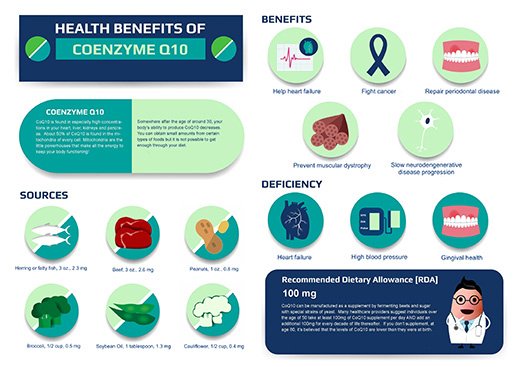CO…what??? That’s a common response when I ask a patient to start taking Coenzyme Q10 (CoQ10), also known as ubiquinone (or in activated form ubiquinol)! Yes CoQ10 has a funny name but your body needs it to produce energy in every cell. CoQ10 is found in especially high concentrations in your heart, liver, kidneys and pancreas. About 50% of CoQ10 is found in the mitochondria of every cell. Mitochondria are the little powerhouses that make all the energy to keep your body functioning!
Somewhere after the age of around 30, your body’s ability to produce CoQ10 decreases. You can obtain small amounts from certain types of foods—3 oz. of beef contains 2.6 mg of CoQ10, fatty fish such as Herring provides 2.3 mg of CoQ10, vegetables such as broccoli and cauliflower have only 0.5 and 0.4 mg respectively. It is not possible to get enough CoQ10 through your diet. The good news is that CoQ10 can be manufactured as a supplement by fermenting beets and sugar with special strains of yeast. Many healthcare providers suggest individuals over the age of 50 take at least 100 mg of CoQ10 supplement per day AND add an additional 100 mg for every decade of life thereafter. If you don’t supplement, at age 80, it’s believed that the levels of CoQ10 are lower than they were at birth!
Blood tests can be used to evaluate the levels of CoQ10 in your body. This is especially important if you are taking certain medications like a statin or if you have certain health conditions. One interesting fact about CoQ10 is that your body has a specific genetic code that changes it to the active form for it to be used efficiently. You may inherit problems from your parents that can make it difficult for your body to activate CoQ10 which makes it even more important if you take the supplement to take the activated form ubiquinol. Many people take the activated form regardless of their genetics since it is approximately the same price and ensures you will be able to achieve adequate levels.
There are some special concerns about CoQ10 that you should be aware of. Some pharmaceutical medications reduce levels of CoQ10 in your body. So if you are taking a statin drug like Lipitor or Crestor to help lower your cholesterol or if you’re using a beta blocker, especially Inderal, to help lower your heart rate, your body may need even more CoQ10!
If you take Coumadin to help prevent clotting, you need to check with your doctor to see if you can take CoQ10 safely. Some Vitamin K’s and CoQ10 might interfere with Coumadin’s job of thinning your blood. Knowing how important CoQ10 is in the body, most providers will adjust the dose of Coumadin to keep you safe or recommend a different medication similar to Coumadin.
So you may be asking yourself, shouldn’t everyone take CoQ10? That’s a discussion you need to have with your healthcare provider. Most of the research on CoQ10 is positive. CoQ10 is found to be helpful in those with congestive heart failure, cardiomyopathy, neurologic disorders such as Parkinson’s disease or Huntington’s disease, dysfunctional mitochondria, high blood pressure, migraine headaches, and those who have had a recent heart attack. Research looks promising for other health issues such as diabetes, infertility and exercise induced chest pain. Studies continue to evaluate other indications for this supplement. Talk with your healthcare provider and stay tuned to new information as it becomes available to see if this may be a good choice for you!
